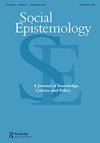信任环境中的科学建议:值得信任,但不值得信任?
IF 2
2区 哲学
Q1 HISTORY & PHILOSOPHY OF SCIENCE
引用次数: 1
摘要
摘要本文考察了值得信赖的科学咨询机制的条件,在这种机制中,科学家有义务为公共决策提供信息。基于对科学的认识信任和公众信任的文献,我们认为,拥有相关的专业知识、合理的道德和政治考虑以及适当的制度设计是提供值得信赖的科学建议的条件。为了进一步评估这些情况,我们探讨了在挪威设立临时咨询委员会的情况。这些委员会体现了一个事实上值得信赖且似乎运作良好的科学咨询机制。尽管如此,这一机制未能很好地实现值得信赖的科学建议的一些核心条件。从中我们可以得到三个教训。首先,区分良好的信任和事实上的信任仍然至关重要。其次,值得信赖的科学建议的某些条件似乎比其他条件更重要,并且每个条件都有实现的阈值。第三,科学咨询的制度设计和组织不仅比人们通常认识到的更重要;更广泛的社会和政治背景以及制度环境的信任和可信度也会产生影响。本文章由计算机程序翻译,如有差异,请以英文原文为准。
Science Advice in an Environment of Trust: Trusted, but Not Trustworthy?
ABSTRACT This paper examines the conditions of trustworthy science advice mechanisms, in which scientists have a mandated role to inform public policymaking. Based on the literature on epistemic trust and public trust in science, we argue that possession of relevant expertise, justified moral and political considerations, as well as proper institutional design are conditions for trustworthy science advice. In order to assess these conditions further, we explore the case of temporary advisory committees in Norway. These committees exemplify a de facto trusted and seemingly well-functioning science advice mechanism. Still, this mechanism turns out to poorly realize some central conditions of trustworthy science advice. From this we draw three lessons. Firstly, it remains crucial to distinguish between well-placed and de facto trust. Secondly, some conditions of trustworthy science advice seem more significant than others and there are thresholds for realizing each condition. Thirdly, not only does the institutional design and organization of science advice matter more than often recognized; the trust and trustworthiness of the broader social and political context and institutional environment make a difference as well.
求助全文
通过发布文献求助,成功后即可免费获取论文全文。
去求助
来源期刊

Social Epistemology
Multiple-
CiteScore
2.60
自引率
17.60%
发文量
60
期刊介绍:
Social Epistemology provides a forum for philosophical and social scientific enquiry that incorporates the work of scholars from a variety of disciplines who share a concern with the production, assessment and validation of knowledge. The journal covers both empirical research into the origination and transmission of knowledge and normative considerations which arise as such research is implemented, serving as a guide for directing contemporary knowledge enterprises. Social Epistemology publishes "exchanges" which are the collective product of several contributors and take the form of critical syntheses, open peer commentaries interviews, applications, provocations, reviews and responses
 求助内容:
求助内容: 应助结果提醒方式:
应助结果提醒方式:


